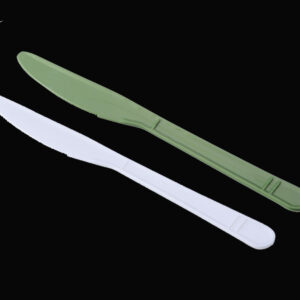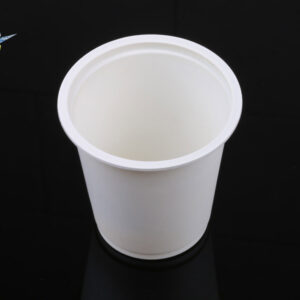Introduction
Disposable plastic products pose significant environmental hazards, contributing to pollution and long-lasting waste in our ecosystems. In response to these challenges, compostable utensils, including forks, have emerged as eco-friendly alternatives that mitigate the adverse effects of traditional plastics. Compostable forks are designed to decompose naturally, offering a sustainable solution that aligns with the principles of environmental stewardship.
Main Materials for Compostable Forks
Plant Starches
Compostable forks are often made from plant starches, such as corn starch and cassava starch. These materials are derived from renewable agricultural sources and are the primary ingredient in many compostable products.
- Corn Starch: Extracted from corn kernels, corn starch is widely used in the production of compostable utensils due to its abundance and biodegradability. It provides a sturdy base for the creation of durable and eco-friendly forks.
- Cassava Starch: Sourced from the cassava plant, it offers similar properties to corn starch and is favoured for its biodegradability and minimal environmental impact.
Plant Fibers
Plant fibres such as bamboo pulp and wheat straw are increasingly used to manufacture compostable forks. These fibres provide strength and flexibility while being entirely biodegradable.
- Bamboo Pulp: Bamboo is a fast-growing plant that produces a durable and biodegradable pulp. Forks made from bamboo pulp are not only sturdy but also environmentally friendly.
- Wheat Straw: A byproduct of wheat production, wheat straw is an excellent raw material for compostable utensils. It is vital, biodegradable, and helps utilize agricultural waste effectively.
Plant Oils
Compostable forks can also be produced using plant oils like palm oil and vegetable oil. These oils are processed to create biodegradable polymers that serve as the utensil base material.
- Palm Oil: When sourced sustainably, palm oil can be used to produce compostable forks. It is converted into biodegradable polymers through chemical processes.
- Vegetable Oil: Various vegetable oils are processed similarly to palm oil, creating a biodegradable material suitable for compostable utensils.
Additives
Certain additives are incorporated during manufacturing to enhance the performance and longevity of compostable forks. These additives can include plasticizers to improve flexibility and antimicrobials to ensure hygiene and safety.
- Plasticizers: These additives increase the flexibility of the forks, making them more resistant to breaking and cracking.
- Antimicrobials: To prevent the growth of bacteria and mould, antimicrobials ensure that the compostable forks remain safe and hygienic throughout their use.
Overview of the Manufacturing Process
Raw Material Mixing
The first step in producing compostable forks involves mixing the raw materials. Plant starches, fibres, oils, and additives are combined precisely to create a uniform mixture.
Molding and Shaping
Once the raw materials are thoroughly mixed, they are fed into moulds to shape the forks. Depending on the final product’s desired characteristics, this process can involve injection, extrusion, or compression moulding.
Drying and Curing
After moulding, the forks are dried and cured to remove excess moisture and set shape. This step ensures that the forks are solid and durable, ready for use.
Packaging and Storage
Finally, the compostable forks are packaged and stored under controlled conditions to maintain quality and integrity. Packaging materials are often compostable as well, reinforcing the commitment to sustainability.
Environmental Benefits of Compostable Forks
Renewable Raw Materials
Compostable forks are made from renewable raw materials such as plant starches, fibres, and oils. These materials are sourced from plants that can be replanted and harvested regularly, ensuring a sustainable supply.
Naturally Biodegradable After Use
One of the most significant advantages of compostable forks is their ability to biodegrade naturally. Unlike traditional plastic forks, which can take hundreds of years to break down, compostable forks decompose within months under the right conditions, returning nutrients to the soil and reducing waste.
Reduction of White Pollution
White pollution, caused by non-biodegradable plastic waste, is a primary environmental concern. By switching to compostable forks, we can significantly reduce the amount of plastic waste in landfills and oceans, thereby mitigating white pollution and its harmful effects.
Promotion of a Circular Economy
Compostable forks support the circular economy concept, where products are designed to be reused, repaired, and recycled. After use, compostable forks can be composted to enrich the soil, completing the natural cycle and promoting environmental sustainability.
Conclusion
The importance of compostable utensils, including forks, cannot be overstated in the context of environmental protection. We can significantly reduce our ecological footprint and contribute to a healthier planet by choosing products made from renewable materials and supporting compostable forks. Businesses and consumers must embrace these eco-friendly alternatives and advocate for widespread adoption.









